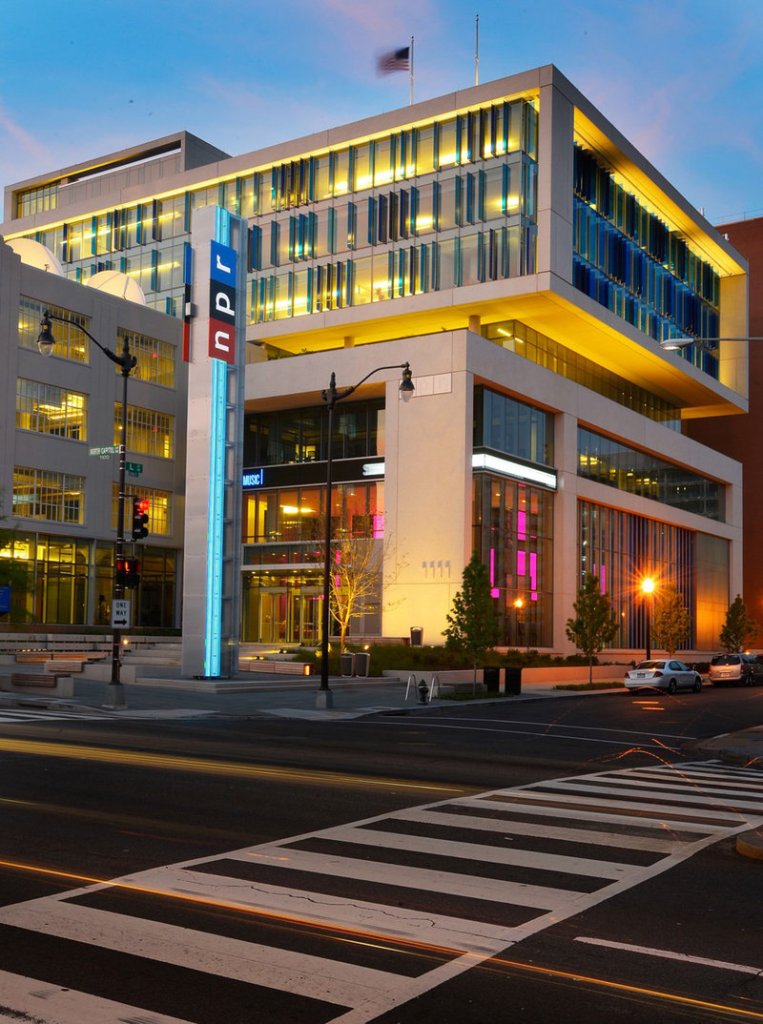NPR’s gleaming new headquarters building in the shadow of the Capitol in Washington has soaring ceilings, a 24-hour “wellness” center, an employee gym and a gourmet cafe staffed by a resident chef.
This, as it turns out, could be a political problem.
Open since April, NPR showed off the 400,000-square-foot complex to members of the media earlier this week. It immediately began drawing some grumbles from those who see the edifice as far too luxe for a nonprofit radio and digital-news organization that depends, in part, on taxpayer support. In effect, the building briefly became a new club with which to beat NPR over an old issue: whether public radio and television should be subsidized with federal and state funds.
The rumblings began after the widely read Drudge Report linked to a rather innocuous account of the news-media tour from the website FishBowlDC, which described the building’s features.
Soon, the blogosphere and Twitterverse were percolating with denunciations of the building’s cost and alleged excesses.
“They build a ‘News Palace’ and they still need taxpayer dollars?!?” tweeted Jim Farley, vice president of news for WTOP, the all-news radio station in Washington.
A blogger known as the Lonely Conservative sniped, “Who wouldn’t be jealous of working in such a lavish space, especially when one’s tax dollars help to fund” it?
And Michael Savage, the fire-breathing conservative radio host, took to his microphone to rail against the “incomprehensible” nature of NPR’s new digs. “They just opened a new building, NPR,” sneered Savage on his syndicated show. “A new building they’re showing off how wonderful it is in Washington, D.C. You will not believe the edifice they built for themselves. It’s astounding. You cannot believe what they gave themselves at NPR. . . . How much money did that cost to build?”
Answer: $201 million, or a bit more than NPR’s annual operating budget of $174.7 million in fiscal 2013.
But is that excessive? In NPR’s view, the new building on North Capitol Street is efficient and cost-effective, particularly compared to its former headquarters a few blocks west on Massachusetts Avenue. NPR, with 840 employees, said it had outgrown the old building, which now being torn down.
“The reality is, we had to move,” said Emma Carrasco, NPR’s chief marketing officer, in an interview. “When we looked at the possibility of retrofitting our existing buildings and consolidating [into the old headquarters], it really wasn’t feasible. So building a cost-effective building was the most prudent decision for us. We based it on pure economics and our staffing and technological needs.”
What’s more, NPR officials point out, the new headquarters wasn’t financed with tax dollars, at least not directly. The organization raised funds through a combination of tax-free bonds, individual donations and the proceeds from the sale of its old building.
In addition, the District granted NPR $40 million in tax abatements and froze property taxes on the site for 20 years as part of a deal to keep NPR from moving out of the city. NPR had considered a site in suburban Silver Spring, Md.
The money raised for the building is separate from NPR’s operating budget, which comes from station fees, corporate sponsorships and individual donations. Less than 2 percent of NPR’s operating budget comes from federal taxes.
But federal support is critical to public radio and NPR because it subsidizes hundreds of public stations, which then pay fees to NPR for its programs. The federal government provided $69.3 million in operating funds to public radio stations this year.
Federal support of public radio and television has long been a contentious issue in Washington’s budget battles. Republicans have sought to cut or eliminate public broadcasting’s subsidy periodically since the mid-1990s but have not succeeded.
But Farley, whose station regularly battles NPR affiliate WAMU-FM for ratings supremacy in Washington, is unpersuaded.
“NPR is a behemoth, and now the behemoth is rubbing our nose in it with this new building,” he said in an interview.
Send questions/comments to the editors.



Success. Please wait for the page to reload. If the page does not reload within 5 seconds, please refresh the page.
Enter your email and password to access comments.
Hi, to comment on stories you must . This profile is in addition to your subscription and website login.
Already have a commenting profile? .
Invalid username/password.
Please check your email to confirm and complete your registration.
Only subscribers are eligible to post comments. Please subscribe or login first for digital access. Here’s why.
Use the form below to reset your password. When you've submitted your account email, we will send an email with a reset code.